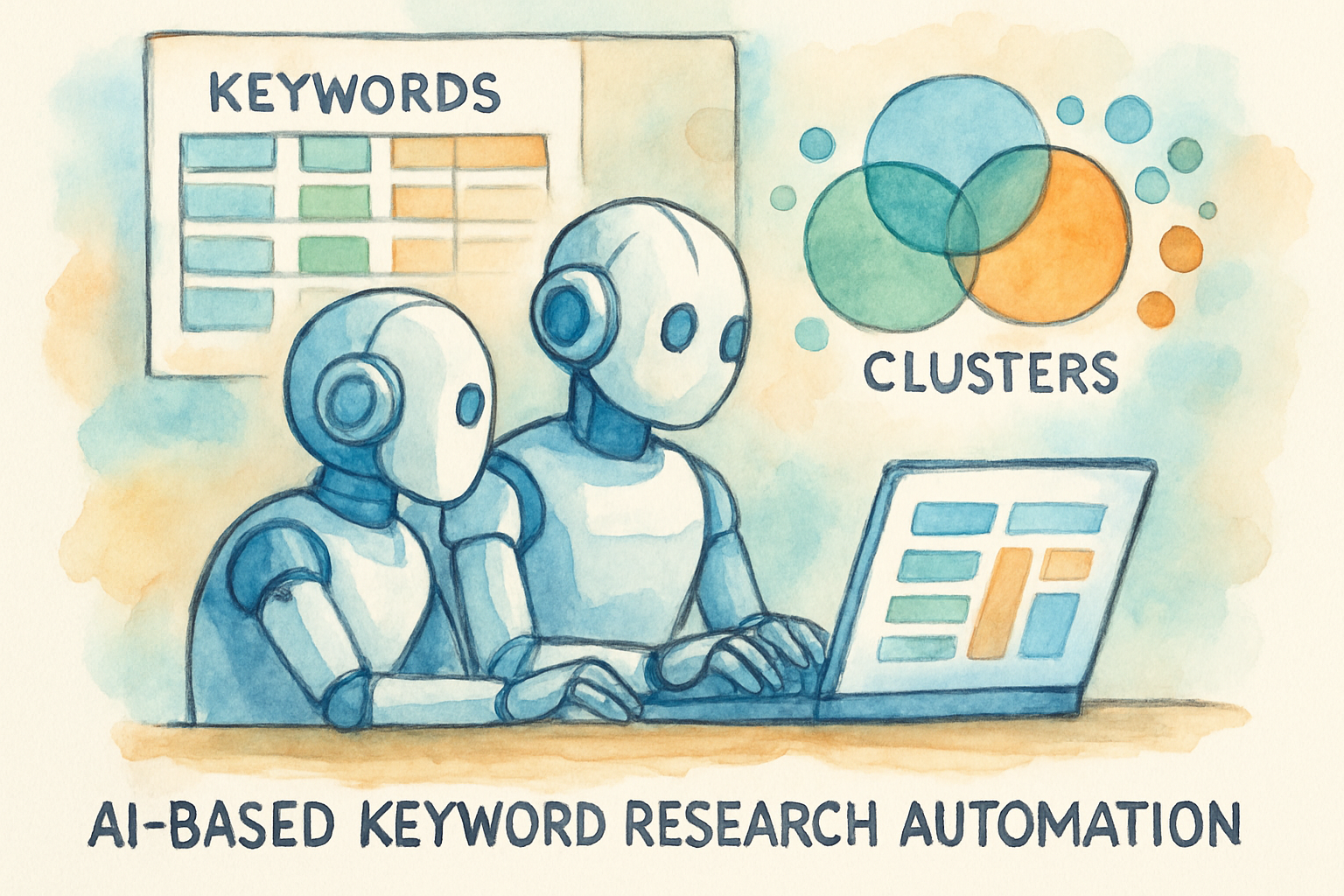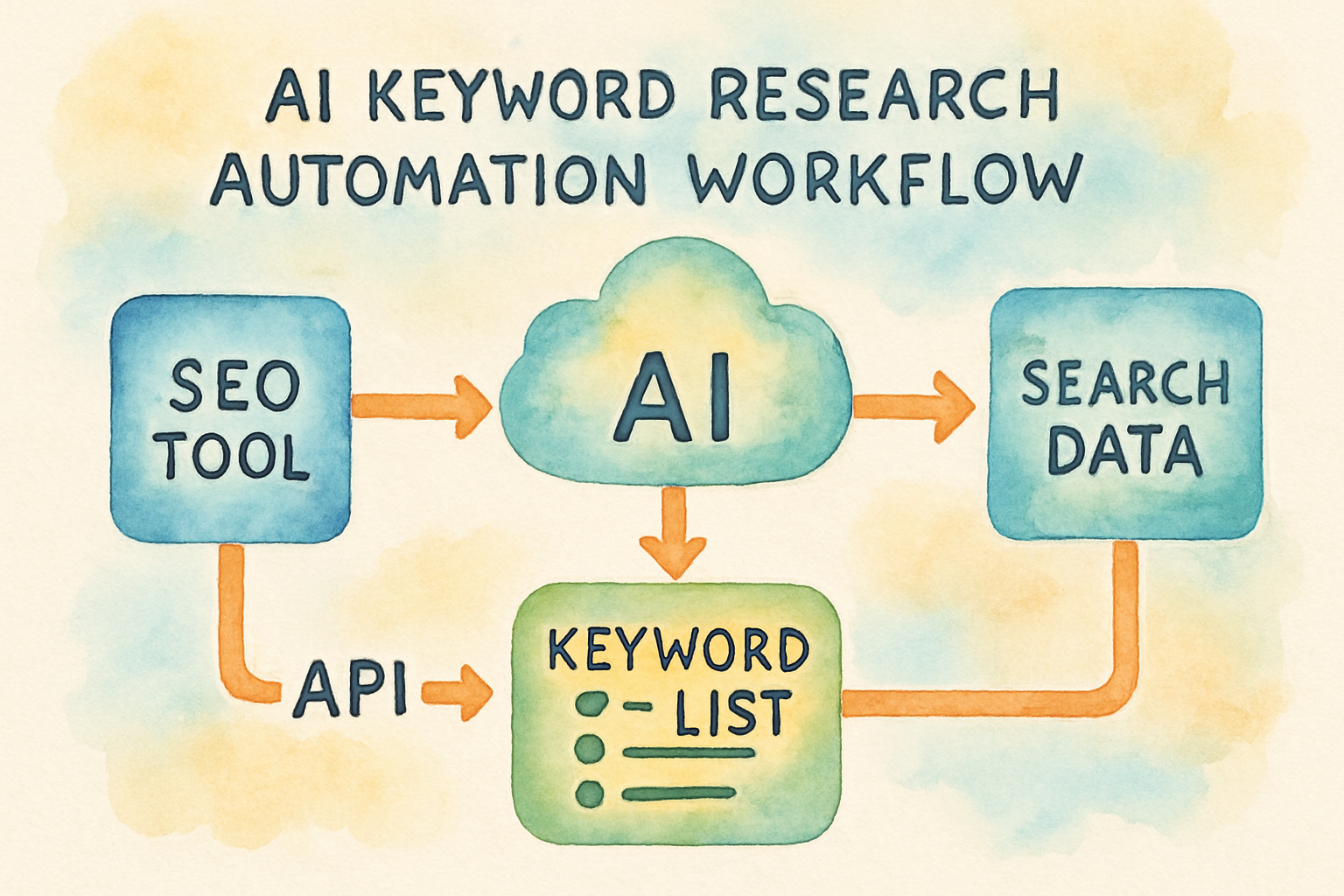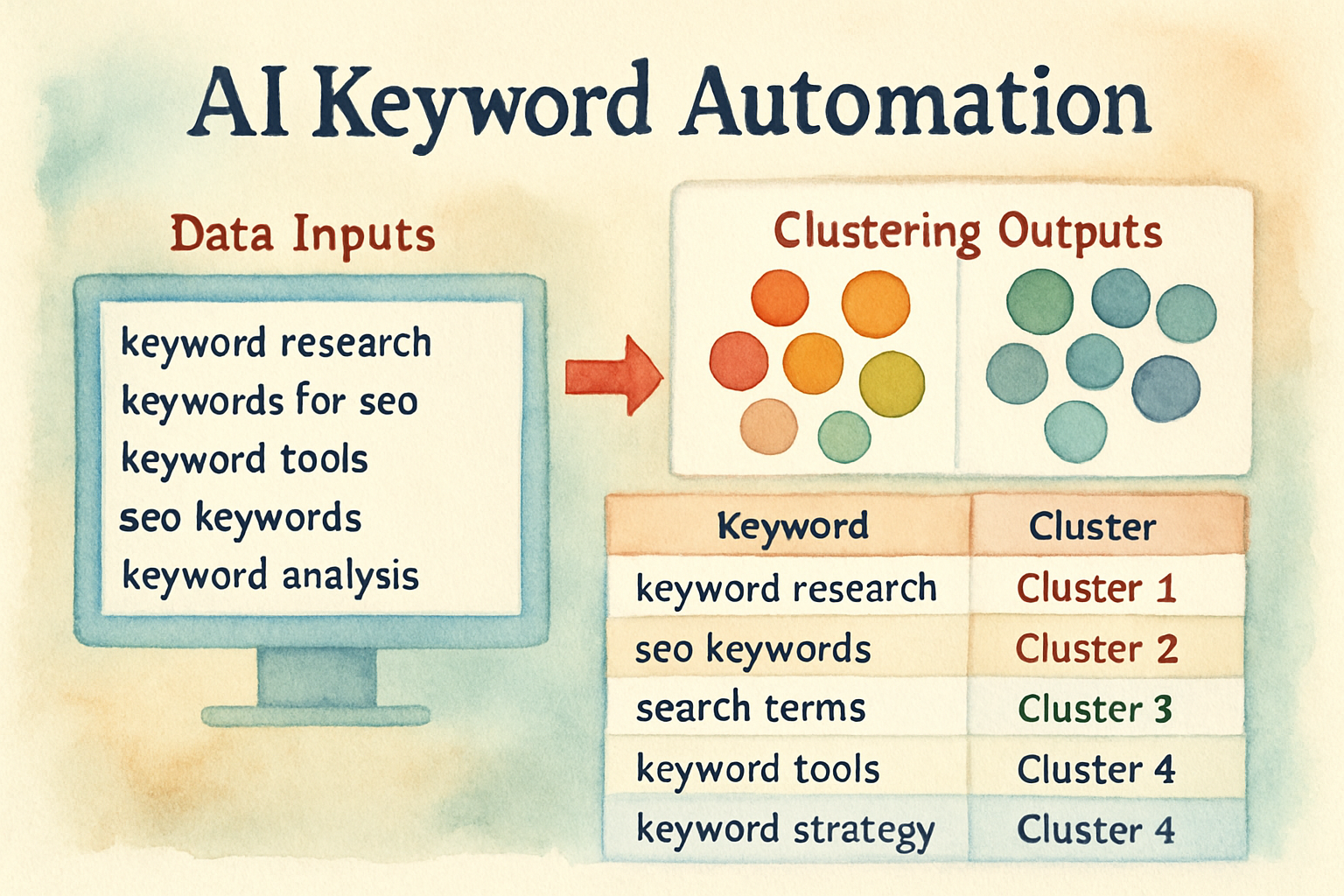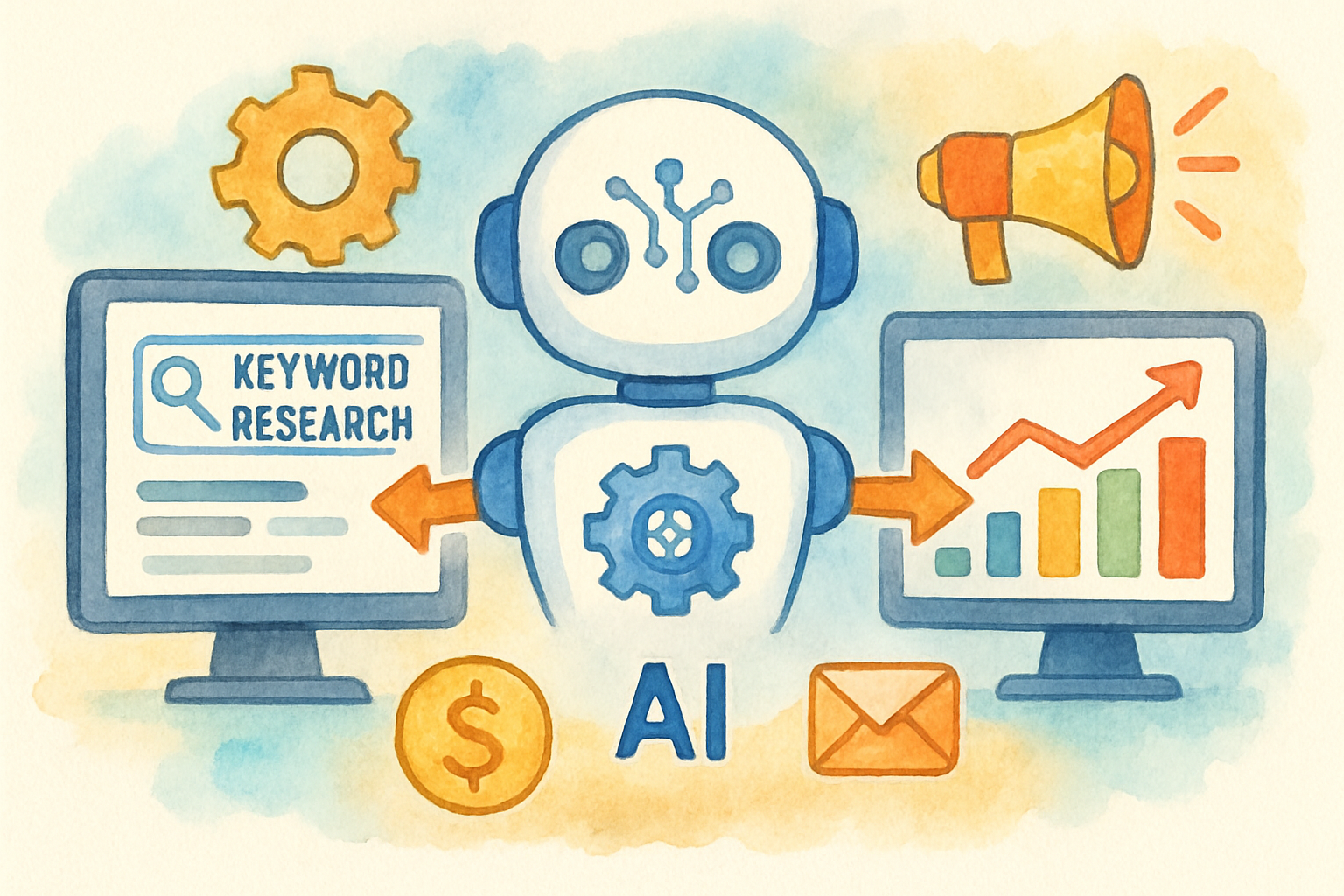TL;DR: AI-based keyword research automation streamlines SEO by quickly generating, organizing, and prioritizing keywords. This guide details every step to harness AI agents for effective keyword research in 2025.
Everyone knows AI is reshaping how marketers approach keyword research and SEO.
But what is AI-based keyword research automation exactly?
Here’s a comprehensive guide covering tools, processes, and expert tips to automate your keyword strategy effortlessly.
Some are driven by advanced AI that analyzes search intent deeply.
Some enable lightning-fast data parsing from thousands of keywords.
Some cluster and prioritize keywords automatically for focused content creation.
Some integrate directly with campaign management to automate PPC bids based on keyword performance.
Let’s dive right in.
What Is AI-Based Keyword Research Automation?
AI-based keyword research automation uses artificial intelligence to gather, analyze, and organize keyword data at scale. Instead of manually compiling lists and metrics, AI agents handle the heavy lifting. They pull data from search engines, analyze search intent, competition, and CPC, then group keywords logically for targeted SEO strategies. This approach reduces hours of tedious work to minutes, allowing marketers to focus on strategy and content creation.
Some software, like AiHello and Teikametrics, go beyond keyword research to optimize Amazon PPC campaigns by automating bid adjustments and campaign creation based on keyword performance.
At its core, AI keyword research automation lets your marketing team delegate repetitive tasks to smart algorithms, boosting efficiency and accuracy. By automatically clustering keyword themes, you can map content strategies that align tightly with user intent and improve organic rankings.
How Do AI Agents Automate Keyword Research?
The process typically involves a team of specialized AI agents performing these four steps:
- Understanding your website and business goals: The AI first analyzes your site, products, or niche to align keyword selection with business focus.
- Fetching keyword data: It pulls keyword suggestions, search volumes, competition, CPC, and other metrics from APIs like Data For SEO.
- Clustering and formatting: Keywords are grouped by theme and intent for easier strategic use.
- Actionable output: The AI generates a detailed list of blog topics, content outlines, and priority tasks to target high-potential keywords.
This process used to take marketers hours or days of manual research and filtering. Now AI accomplishes it in minutes, with better precision thanks to massive data processing capabilities.
For example, in a video demonstration, a team of AI agents automatically analyzed 50 targeted keywords, sorted them by relevance and intent, and produced a prioritized SEO content plan. This kind of automation lets SEO teams stay nimble and focused on high-impact activities.
See the full demonstration here.

Top AI Tools for Keyword Research Automation in 2025
Several AI-powered keyword research tools have gained dominance, each catering to different marketing needs:
- AiHello: Known for automating high-volume campaign creation, bid adjustments, and keyword harvesting for Amazon sellers. It integrates real-time AI bidding with human PPC experts, making it ideal for sellers scaling campaigns fast.
Learn more about AiHello’s capabilities. - Data For SEO API: Provides an extensive dataset powering numerous keyword research tools. Marketers can use this API directly with automation platforms like Make.com to design customized workflows for keyword suggestions, ideas, and search engine results.
A step-by-step tutorial on using Data For SEO API for automation. - Simrush: A comprehensive AI tool offering keyword research, on-page SEO optimization, and competitive analysis. Its AI capabilities help generate blog ideas and rewrite SEO content for improved rankings.
- Surfer SEO: Uses natural language processing to optimize on-page SEO and keyword use dynamically while writing content.
- Originality AI: Though focused on content authenticity checks, it complements keyword research tools by assuring plagiarism-free, uniquely AI-verified content.
Choosing the right tool depends on your business size, market, and budget. For example, AiHello suits sellers looking for automation with human assistance. Simrush and Surfer SEO fit marketers focusing on content optimization driven by AI insights.
Can I Fully Automate My Keyword Research with AI?
Absolutely! Fully automated keyword research means letting AI handle the entire pipeline—from data gathering to strategic keyword grouping. You can set up workflows that feed your core keywords, run them through APIs, cluster results, and output ready-to-use topic lists with prioritized actions. This transforms an overwhelming research phase into a repeatable, low-touch process.
Automations like these not only save time but also reduce human errors and biases in choosing keywords. With constant re-runs, your keyword strategy can stay fresh and adapt to changing search trends automatically.
Pro Tip: Regularly review automation configurations and outputs. AI is powerful but benefits greatly from strategic input and periodic quality checks for context relevancy.
How to Build Your Own AI Keyword Research Automation Workflow
Building your own AI-driven keyword research workflow involves combining tools and APIs with automation platforms. Here’s a practical breakdown:
- Choose your core tools: Start with a keyword data provider like Data For SEO API and an automation platform such as Make.com (formerly Integromat).
- Design your data flow: Input a seed keyword list into a Google Sheet or database.
- Fetch keyword suggestions and ideas: Use the API modules to pull keyword data, including variations, search volumes, CPC, and competition.
- Extract search engine results: Collect SERP data to analyze top-ranking competitors and understand content expectations.
- Cluster and organize keywords: Implement scripts or AI agents to group keywords by themes, intent, and priority.
- Output actionable lists: Export keyword groups, blog titles, and content outlines as structured documents or spreadsheets.
- Iterate and optimize: Use feedback loops to refine keyword groups and surface the best opportunities.
Such workflows typically require some initial setup but are highly reusable and scalable. Marketers can expand them by adding steps like content optimization, rank tracking, or campaign creation using PPC tools.

Why Is AI Automation So Crucial For Modern SEO?
SEO is no longer just about sprinkling keywords. It demands ongoing analysis of search intent, competitor moves, market trends, and user behavior. Manually handling this consumes cramped budgets and leaves room for errors.
AI-based keyword research automation helps by:
- Speed: Automate massive keyword data gathering in minutes, not days.
- Accuracy: Use real-time and high-volume data sources for better keyword targeting.
- Scalability: Generate hundreds or thousands of campaign ideas fast, essential for large product catalogs or diverse markets.
- Optimization: Integrate with bid management and campaign automation tools to refine PPC spend and increase ROI.
- Insight: Cluster and prioritize keywords by intent for more effective content planning.
For instance, Amazon PPC tools like AiHello automate bid adjustments and campaign creation based on AI predictions, helping sellers focus on product launches and growth instead of tedious campaign management.
Explore AiHello's AI-driven PPC automation.
How to Go Beyond Keyword Research with AI
AI can also enhance other SEO areas beyond just keyword discovery and clustering:
- Content Creation: Some AI platforms automatically generate first drafts of SEO-optimized articles based on keyword insights, humanizing flow and providing ready-to-publish content.
Watch a demonstration of an AI blog writing agent. - Bid Optimization: AI-powered PPC tools adjust bids dynamically based on hourly performance, inventory changes, and seasonality, maximizing ad efficiency.
- Competitive Analysis: AI analyzes competitor keywords, pricing, and campaign strategies, uncovering new opportunities or gaps.
- Plagiarism and Originality Checks: Tools like Originality AI check content to ensure it is unique and AI-generated content is properly humanized for quality and trustworthiness.
- SEO Audit and On-Page Optimization: AI-powered audit tools scan your site, provide optimization suggestions, and automate meta-tag generation at scale.
How Do I Choose the Best AI Keyword Research Tool for My Needs?
Selecting the right AI tool depends on your specific goals, size, and resources. Consider the following:
- Business size: Small sellers might prefer affordable and simple AI tools like Sellerapp or Adtomic, which automate basic PPC tasks.
- Complexity of campaigns: For large-scale, multi-market campaigns, advanced platforms like Pacvue or Quartile offer powerful rule-based and AI automation.
- Integration needs: If you want seamless integration with your existing SEO workflows or content management, tools supporting APIs and automation platforms are best.
- Support and managed services: Some tools offer dedicated account managers and expert teams (e.g., AiHello, Sellozo), valuable if you need hands-on assistance.
- Budget: Consider upfront monthly costs but also potential ROI through time savings and better ad targeting.
Make sure to test tools with free trials or demo versions when possible. Many AI SEO platforms offer this to prove value and ease of use before commitment.
How Can I Experiment With AI Keyword Research Automation?
If you’re new to AI keyword research, start small. Use tools that let you automate parts of your research process—like fetching keyword suggestions or grouping keywords automatically. Gradually expand to include content planning and bid automation.
Also, consider joining communities like the AI Ranking School where SEO professionals share automation workflows, scripts, and tips for using APIs like Data For SEO effectively.

Frequently Asked Questions About AI-Based Keyword Research Automation
What is the biggest advantage of using AI in keyword research?
Speed and scale. AI can analyze thousands of keywords in minutes, identify trends and clusters, and provide actionable insights that would take humans hours or days.
Are AI keyword tools accurate?
Accuracy varies by tool and data sources, but most leverage extensive databases and constantly update algorithms to reflect market trends. Always cross-verify crucial data and combine AI insights with human expertise.
Can AI replace manual keyword research?
AI automates repetitive and data-heavy tasks but human strategy remains critical to interpret results, choose priorities, and create meaningful content that resonates.
How do I integrate AI keyword tools into my existing SEO workflow?
Use API-based tools with automation platforms like Make.com, or choose integrated SEO suites like Simrush or Surfer SEO that connect keyword research directly with site audits and content optimization.
What’s Your Next Step?
Tell us in the comments: How will you apply this to your AI based keyword research automation? For personalized advice, contact us!
Ready to explore more about leveraging AI in marketing? Check out our detailed content marketing strategy guide to skyrocket your organic traffic.
For deep dives into keyword research tools, compare options in our Long Tail Pro alternatives guide that helps you find the perfect fit for your SEO goals.

Empower your SEO with AI today. Harness the power of AI-based keyword research automation to save time, reduce error, and grow your organic presence smarter—not harder.
Information checked and verified with sources as of 2025-08-28.
Backlink resources:
Discover how technology and tradition combine in business innovation by reading this guide on smarts and crafts.
Explore how AI payments are revolutionizing finance with enhanced security and scalability at Ventureindet.com.